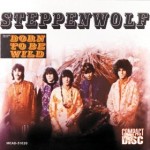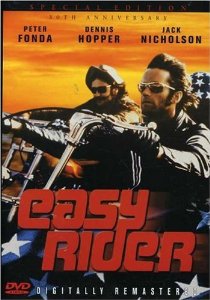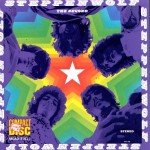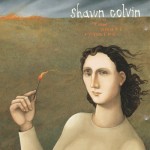For over four decades, one of the best ways to “get your motor running” when you’re “looking for adventure” is to crank up “Born to Be Wild” on the stereo, the timeless first hit single from the band Steppenwolf. The voice that calls you to action in that song is that of singer John Kay. Steppenwolf went on to have other hits in the late ’60’s and early ’70’s, including “Magic Carpet Ride” and “Rock Me”, and their music has been used in seemingly countless movies and TV shows starting with Easy Rider, which featured “Born to Be Wild” and “The Pusher”. The band broke up in 1972, but has been active off and on since then in various incarnations.
In addition to musical pursuits, Kay and his wife Jutta devote much of their energy these days to the Maue Kay Foundation, which works to protect wildlife, the environment, and human rights.
This interview is for John Kay’s concert on 1/30/15 at SOhO in Santa Barbara; also performing is The Dirty Knobs, a band which features Tom Petty’s longtime guitarist Mike Campbell. (An earlier interview with Mike Campbell is here.) It was done by phone on 1/15/15. (Jutta Maue-Kay photo)
John Kay: This is a show for SOhO. I’m told that the club needs to raise some dollars – they’ve got some projects in mind. So it came to pass that I spoke to Mike Campbell from The Dirty Knobs, and we’re going to do a hybrid thing. I’m going to do a half hour acoustic solo set, and then I’ll be joined by them to do a handful of Wolf songs, and then after a short break they will take over and do what they do. And hopefully they’ll raise some duckets for the cause.
I’m no longer very active other than playing about ten or twelve selected dates with the Wolf, which at this point I do primarily because it enables my wife and I to take our respective share of the net proceeds and put that into our little foundation, which in turn then can do what it does with its money every year without running out of money. You might say that the “cash wolf” keeps on giving. But I’ve been doing this for so long that, as much as I enjoy the company of by bandmates, this line-up pretty well without exception including our crew has been the same since 1981, so we’re all kind of familiar with what we do, but as much as that is enjoyable – we played last year, I guess the closest we came to this market was at Pacific Amphitheatre in Orange County – that’s my modus operandi at this point.
But I do on occasion do some solo stuff for fundraisers for causes I believe in. And this is one of them, because I think it’s important to have local venues that give a showcase opportunity to regional and local acts. I mean, we have wonderful theaters like the Lobero and all of that, which is great, but not everybody can take on a venue that size. So I think it’s important to have other options, and from what Gail [Hansen] tells me at SOhO this has been a labor of love for them for quite some time, and I’m very happy to lend a hand and do my little bit to preserve it.
Jeff Moehlis: We’re certainly happy that you’re doing this! I know that you live in Santa Barbara at least part-time. Do you have any favorite SOhO memories, maybe shows that you’ve been to in the past?
JK: I wish I could tell you that I have. My first SOhO memory will be made this afternoon when I set foot in the club for the first time to take a look at what I’m dealing with. I have been aware of the club because I read the local publications, and I always scan through who’s playing where – names of performers, many of whom I’m familiar with, have appeared on the SOhO roster of performances. The thing that struck me however, the more I took a closer look – after Hale [Milgrim] called me and asked if I’d be willing to do this, I obviously took a closer look at the whole SOhO thing and went to their website and kind of went through various upcoming shows and who’s playing – I was struck that it appears to me that the club has a very broad horizon in terms of the types of music that it showcases, from jazz to whatever else it else. To my way of thinking, that makes the club even more important. We all know about certain venues in different cities, some of them iconic venues, that all they ever did was heavy metal, another place that’s strictly jazz. In a smaller community like Santa Barbara is compared to L.A. or New York or Chicago, having a place that gives a variety of different music genres, and at times even things that are not necessarily the music that’s being featured, is even more important.
I’ve been bopping around these last 25 years. Steppenwolf of course was formed on Fountain Avenue, I guess it’s more or less in between the West Hollywood and Hollywood area, back in ’67, but after over 20 years of being an L.A. band for a variety of reasons I relocated Wolf World as it were to the Nashville, Tennessee area. My wife and I had a very nice property out in the country, a lot of privacy. I built my recording studio there – we had a big barn for the tour bus and the truck, you know all of the stuff. We were a full-blown Wolf World with offices and stuff, running publishing companies and production companies, and all the rest of it. We were there for 17 years, and some of our neighbors were others who had migrated – at least part of the year they were in that neck of the woods, Michael McDonald being one of them.
But after 17 years there, my wife Jutta and I wound up spending much of our time at another house in Vancouver, British Columbia. Then eventually through circumstances – I won’t bore you with the details, it really doesn’t matter – we considered Santa Barbara as a place to basically be our homebase. Because we didn’t want to get into multiple homes, and all of what that entails. And through a number of fortuitous events we came across this place that we have now, made our main home here, and we’re very happy with our choice. We’ve been here, I guess, roughly three years, and have made some good friends, some in- and some outside the music-related connections. And considering this being our permanent homebase, when there are situations such as in this case the SOhO club, where it’s part of the fabric of the culture of the community and so on, I was glad to do my little bit for that purpose.
But I have not been in the club. I have checked out photos and this and that. I’m one of these guys that doesn’t just leap into stuff. I like to kind of know what I’ve said yes to, so this afternoon Gail and I are going to briefly meet, and I’m going to get comfortable with what the venue has and does not, and what I need to bring, and that sort of thing. Then we’ll go from there.

JM: One of the iconic Steppenwolf songs is “Born to Be Wild”. Can you tell the story of how that came together into the form that we know and love?
JK: It’s a song that [laughs] has its own stand-along separate-from-Steppenwolf career, you might say. In the last 15 years I’ve been in places like Botswana and Burma, and if at some point it comes up as to what do I do and the name Steppenwolf comes up, quite often they’re not familiar with the name of the band. But if they ask about a song that they might know that we do, if I mention “Born to Be Wild” they know it. It’s a song that, in fact, our guide in Burma said, “Oh, every bar band in Yangon must know this song or they will not be hired.” [laughs] In Yangon, believe it or not, I saw a Burmese quartet of young guys, they couldn’t have have been more than 21, 22 years old, and they played Eric Clapton songs flawlessly. I mean, this stuff penetrates, it gets into strange and unusual areas.
It started with a cassette tape made in the middle of the night in a boarding house near Cahuenga [Blvd], I think, in Hollywood, by one Dennis Edmonton, who had been the guitarist in the forerunner of Steppenwolf, a Canadian band called The Sparrows, which I had joined when I was hitchhiking around doing my acoustic solo journeymen stuff in certain clubs where they’d let me. I had joined them up in Toronto, Canada, and that band had migrated after getting a Columbia Records deal down to New York, and eventually Los Angeles, and then in the Bay Area. This, that, the other thing, we busted up in ’67 in L.A. But he went off to become a solo artist that didn’t really go anywhere, but mainly a songwriter, and he changed his name to Mars – as in the planet – Bonfire. And he kept in touch with the rest of us who had, after the demise of the band in L.A., some of us remained there, including his brother, his drummer of the band.
Well, his brother Jerry Edmonton, and I stayed in touch, along with the keyboardist Goldy McJohn from The Sparrows, and when Steppenwolf was formed by the three of us plus two Los Angeles fellows that we had run across before, one of them a young 17 year old guitar player by the name of Michael Monarch, the other one Rushton Moreve who was a bass player that we came across through an ad. We were rehearsing literally in a garage. One day Jerry’s brother, the newly renamed Mars Bonfire, he had brought this cassette tape that he had made in the middle of the night in the boarding house where he couldn’t make any noise, so he was playing into the cassette recording, playing his Telecaster guitar without any amplification, and he had to almost whisper the vocal [laughs]. And he dropped this cassette into the mail slot of the front door of the girlfriend of our drummer that he was living with, and she had a huge Great Dane. Mars thought, “Well, the dog’s making noises. He probably ate the damn tape.”

But no, Jerry brought the tape and we listened to it. And I initially thought, “Well, it’s pretty low key, man!” You know, “This doesn’t sound very rock and roll.” But we worked on it, and the Steppenwolf version of the song was then one of eleven tracks that comprised our first Steppenwolf album, that had “Born to Be Wild” and “The Pusher” and other songs on it. So that song, once it was included in the soundtrack of Easy Rider, and subsequently in numerous other movies and TV shows… in fact, I think as of about 7 or 8 years ago, Steppenwolf music, “Born to Be Wild”, “Magic Carpet Ride”, “Desperation”, “Don’t Step on the Grass, Sam”, and numerous other songs, but primarily the heavy hitters, “The Pusher” and so on, have been featured in over 115 motion pictures, most of them out of Hollywood, some of them international. And, even more, television shows. It’s a song that sort of left home.
I remember coming years ago back from Africa. My wife and I had been in a mobile tented camp that was in Tanzania, totally off the grid, and checking my email I had little blurbs from different people saying, “Congratulations on the Mars landing!” [laughs] I said, “What the hell is that about?” So I called our office, and they said, “That’s right, you don’t know, do you? When the little robots”, those little landing craft things, “when the Mars landing took place in your absence, and the spacecraft had the little ramp lowered and these two little solar powered robots came down the ramp, they played ‘Born to Be Wild’.” And so it was the Wolf in space [laughs]. We’ve woken up the Space Shuttle crew twice with the song. It’s just a song that has a life of its own.
I have an anecdote I often tell people, and I’m fairly certain although I would have to actually check my records, but I’m fairly certain it was “Born to Be Wild” and not “Magic Carpet Ride” [JM: confirmed by imdb.com]. It goes back many, many, many years. That was before I sold all the music assets so I could have more time for our foundation, which is all about wildlife protection and conservation. I was talking to one of the guys I spoke to regularly at Universal Music Group that had bought up the defunct Dunhill Records which we had been recording for, and therefore had all of the master recordings. Whenever they wanted to license something, they needed Steppenwolf Production, Inc.’s blessing, and so they would call me. “So we have this, that, and the other thing,” and then we would discuss it and it would be either “Yea” or “Nay”. So this one time he calls up and he says, “You know, Disney has been repurposing some of their iconic cartoons”, like Donald Duck and that sort of thing, “and what they’re doing is they often take the premise, or at least the idea or the title, of a currently very popular motion picture. For instance, what they’re approaching us about is something they want to call Down and Out with Donald Duck, because Down and Out in Beverly Hills is a big movie. So they re-edited this thing, and they want to use ‘Born to Be Wild’ in some context. So what do you think?” And I said, “What would you normally suggest?” He said, “X number of dollars”, and I said, “Well, I want you to triple that.” And he says, “Well, they won’t pay that. This is the first time… Why is that?”

“Well, first off when it comes to cartoons I’m a Warner Brothers guy. But number two, and more importantly this is something I want them to pay because when the Wolf was a baby band, and we had just been formed, we had no hits yet, my wife and I and our drummer and his wife wanted to go to Disneyland. And they refused us entry because of our long hair.” When they said, “Are you by any chance members of the Screen Actor’s Guild?” I said, “No, just musicians”, and they said, “No”. And I said, “Well why is that?” And they said, “Well, if you were an actor, we could just say, well, you know, you needed to grow this long hair for a role”, and so on. Well, of course, within 18 months all of this changed, because every kid in the neighborhood in Anaheim and beyond also had long hair, so they changed their policy. I said, “I want to charge them a nuisance fee for what they put me through that day.” He said, “Well, they’ll never pay it”, and I said, “Well, that’s just fine. That way I’m not involved with something that I’m not that crazy about to begin with”, and let it go.
Well, over a year went by, and I’m talking to the same guy again about something totally unrelated, and he says, “Oh, and by the way, the money from Disney finally came in.” And I said, “What, for Donald Duck?” “Yeah.” I said, “Did they pay the triple rate?” He said, “Yes they did.” I said, “Well, how did that come to be?” He said, “As usual, the business affairs people are way behind with their paperwork as compared to the production.” This was back in the days when Disney had strung together independent TV stations across the country, and would send them Betamax tapes of The Wonderful World of Disney, or whatever the show was. And so the production had gone ahead, they had finished it, they had made whatever, 500 of these tapes, they had sent them to the stations, and they were ready to go. And here comes Business Affairs and says, “We don’t have the rights to the song that’s in there.” [laughs] So they said, “Well, we’d better pay what they want.” So I got even [laughs].
So that song, it and “Magic Carpet Ride”, are sort of like the Clydesdales, the workhorses that have been pulling the Wolf Wagon for quite some time. But there are, of course, lots and lots of people who were familiar with our work beyond the hits on AM radio, and really they were the meat and potatoes support, because it was the album sales that sustained our career. Particularly things like the Monster album, which was very popular on college campuses during the anti-Vietnam War demonstrations, and all of the other things. So we were kind of lucky in the sense that we had hits on AM radio and we had a lot of exposure on the then-burgeoning so-called underground radio, which then became over time even more dominant, you know, FM stereo and all of that. We were just in the right place at the right time. And instead of people back then saying, “It’s not radio-friendly”, because it doesn’t sound like everything else that’s already on the radio… there was a lot of confusion amongst the people that were running the labels back then. I mean, the president of the company that signed us told us straight out in our first meeting, “I don’t get it, I don’t understand it. My 16 year old daughter loves it so we’re going to take a chance.”

JM: I wanted to ask you about “Magic Carpet Ride”, another of the great songs that you guys did. There’s various theories floating around on what the song is about, or what inspired it. You know, there’s “The Holy Trinity” – it could be sex, it could be drugs, it could be rock ‘n’ roll. I even read that there’s a certain fraternity that claims it was inspired by their initiation ritual.
JK: I’m familiar [laughs]. There are numerous theories and mythologies around this thing. I will simply say that I wrote the lyrics and the melody to the thing, and you can take the lyrics at face value. But I have run into numerous people who had a particularly potent serving of mushrooms or whatever, and they would come up and go, “I know what that’s like really about, man. It’s about the nebula out past the…” “OK, you know, if that’s what it means to you.” In this case, the meaning is in the ear of the beholder.
The whole thing started with our original bassist. Every time we did a soundcheck or messed around with some ideas, he played this riff, the riff that’s the backbone of what became “Magic Carpet Ride”. And when we were recording our second album, he was doing so again. And as it turned out, the aforementioned Mars Bonfire, who had written “Born to Be Wild”, had brought another song to us, and he was in the studio. Being a very competent – to say the least – guitarist himself, he had the guitar on trying to show us another song. So when Rushton started playing this riff that became “Magic Carpet Ride”, everybody was on the floor behind their instruments and kind of fell in playing along with it. The engineer and producer in the booth were saying, “Keep going, keep doing that.” And they quickly got a mix together, and captured I’d say 60 to 70 percent of the meat and potatoes part of the rhythm track of that song.
I said, “You know, I have an idea for this thing. Make me a cassette tape, will you, and I’ll go home.” It just so happened that with some of the first royalty money that had come in, my wife and I had bought a really substantial quality stereo system. Fairly large speakers and everything else. And I put the cassette tape into the machine to play through that newly-acquired system, and really wrote those lyrics in about 20 minutes. “I like to dream, between my sound machine”, and all of that. The stereo system sort of was the kick-off to the lyrics, and then I let myself kind of go into my own head, in terms of what I was writing about. In many ways, I felt after it was done, “I’m just going to let it be what it is, the way it came out. I’m not going to tweak the lyrics to make it something different.” Whether it is something comprehended, whether it becomes something people speculate about, sometimes leaving things open to speculation makes it even more widely subject to interpretation, and therefore popular.
I remember having a conversation with somebody one time about some Doors lyrics, and they were so non-specific that having left them open to interpretation was probably a great deal of the appeal of them. So when people come up with their theories about “Magic Carpet Ride”, I usually just smile and tell them, “Your opinion is as good as the next guy. Go with it.”
JM: What advice would you give to an aspiring musician?

JK: Well, unfortunately I feel compelled to echo what I saw and heard Richard Thompson, whose show we saw and he was as usual quite absolutely astounding. I remember seeing him for the first time at the New Orleans Jazz & Heritage Festival, which in fact we’re going back to visit New Orleans later this year. I was just astounded at how one man with one guitar could be totally self-sufficient with respect to rhythm, leads, bass figures. It was just quite astounding. But anyway, what he said in an interview preceding his recent appearance in Santa Barbara, answering the same sort of question, he said something to the effect that you’d better have pretty good T-shirt sales. [JM: JK is perhaps talking about this article, where I asked Richard Thompson the same question.]
I mean, the unfortunate reality is that the system, the whole music industry as it once functioned, once being, what, 10, 15 years ago, what have you, has shrunk in scope and size. OK, you have Taylor Swift, you have Beyonce, and only a few others, and they manage to work it on a variety of levels in terms of revenue and so on. They do fine. But I think it speaks volumes that only a couple of albums last year, 2014, managed to get past the platinum sales plateau of one million hardcopies, meaning CDs. And that was the soundtrack for Frozen, and Taylor. Now, they had download sales in addition, which were not inconsequential, but overall they’re the peak of the pyramid, which has become a smaller pyramid by far.
I mean, I’ve seen great bands who I thought were wonderful – I saw Dawes here at the Lobero, and quite a few other acts, mainly because Hale keeps steering me to new artists I’m unfamiliar with. They’re really excellent bands and songwriters. There’s the Americana thing, and some of my ex-neighbors in Tennessee like John Hiatt and others are working through that channel. It’s not as though you can’t make any living at all, but it’s a lot harder for baby bands starting. If you want to do the route of four guys and/or girls, or women and men, basically living in a van with their gear trying to cobble together a network of clubs through which they can develop a following, and giving some of their self-recorded projects away on the internet as a means of bonding with their support base and all the rest of it, I’m sorry to say that you have to have a really intense fire in your belly to withstand what that entails, and the stamina that it requires for you to do that.
Not to mention the fact that you’ve got to get lucky in a number of ways – timing, and being at the right place at the right time obviously plays a role in anybody’s life and career. I’ve heard people that I felt were far more talented than their meager earnings generated, and yet for whatever reason they didn’t click with enough people to enable them to make a decent living. So I don’t want to sound gloom and doom, but I would say the old adage of something that I think any college athlete or high school athlete is told – make sure you’ve got something else to fall back on.
I must’ve met, I don’t know, a couple hundred people in the last 40 years who came to our concerts or whatever and said, “When I was roughly your age when you started, I had a band locally.” Kevin Costner told me this. You know, one of my oldest living friends is Michael Blake, who wrote Dances With Wolves. He loves Steppenwolf. He used to work for a freebie paper out of Albuquerque when we did our first cross-country promotion tour in ’68, and we’ve been friends ever since. After the success of the film, Kevin, who had a band, played in Vancouver, and we talked a while. He was saying, “I was, too. It was a bunch of guys in the garage, and we learned some of your songs and some other songs, and we wanted to get somewhere.” Well, he went through a very successful acting career, and he’s still very much music-focused and has a really good band, and in Canada and Europe and other places they do just fine. But that’s primarily because he has a marquee value name that is recognizable. But I’ve met a couple of hundred or more people in my travels over the years who’ve said, “We still get together on the weekends, with some of my old buddies, and play a little”, in somebody’s basement or at a party or whatever, but thank goodness for the most part they wound up doing something that paid the rent and kept the roof over their head, and so on.
The truth is, if I hadn’t gotten lucky in some ways… I was not somebody who was crazy about school. I was more of a high school drop-in. I was hanging out with guys that were into rock and roll, and pool halls. They had their used cars they cobbled together, or motorcycles or whatever. Music was my focus, and if that hadn’t worked out, hard to say where I would be.
So keep an eye open for Plan B. I mean, apply yourself to what your pursuit is, if you really think you can withstand the rejections and the turn downs and the disappointments and the indifference that you will come across, without question. If you’re one of the few chosen ones, one out of a hundred thousand that doesn’t have to run that gauntlet, then I salute you. But most of them will run into, at a minimum, indifference, and often outright rejection and disappointment. And you have to really develop a tremendous amount of emotional stamina to say, “God dammit, this is important to me. I’ve got something to say worth hearing, and I’m not going to let these naysayers talk me out of it.” If you have that kind of fire in your belly, go for it.
I’ve run into situations where the talent was much greater than the determination. I’ve run into people, early on, people who were significantly more talented than I was playing guitar or whatever. “Did you go to the audition yesterday at 10:00AM?” “Well, no. I had a long night, you know, short of sleep. I’ll go to the next one.” But then I know other people whose main talent was just greediness and marketing and determination, who never missed an opportunity for networking or doing auditions, or learning from somebody else, and keeping an ear open for opportunities to show what they were up to, and through sheer determination eventually wound up in something worth being a part of.
So the way I look at it, it’s the proverbial “many roads lead to Rome”. It’s not as though there’s only one way. I can’t bear, I could not bring myself to watch these America Has Talent and all these other shows. I heard that The Voice is pretty good. But ever since back in the 70’s [actually, 1983-1995] there was a show hosted by Ed McMahon [Star Search] that was all singers. They would come out, and they got their two and a half minutes. They felt compelled to impress with their vocal skills, so rather than singing or performing the song, they had to basically wrestle it to the ground and beat it into submission, with what I would call chronic Patti Labelle syndrome. You don’t sing the song, you use it as a platform for showing your vocal acrobatics. And I think from that time on, unknown talents being shown on TV was kind of stuck in that groove, namely you have two minutes to impress. Of course, some of the more recent shows, meaning the last five years, you have this jury that sits in judgment of you, and there were some people, based on what I read, who seemed to enjoy the opportunities to humiliate and nitpick. To me, I found that to be significantly more than distasteful, but I understand that for many people this was one of the few opportunities to have a shot at showing what you’re about in front of millions of people. So the attraction of all of this is self-explanatory. But I honestly think that it’s a very unfortunate development, and it speaks volumes about the limitations of what other paths exist for young talent.
The way that the whole industry has changed, a lot of it in my opinion had to do with the advent of Napster and other developments such as that. Since we unfortunately continue to suffer from a Congress that by and large – thank goodness with certain exceptions excluded from being tarred with the same brush here – since they seem to lack the intellect to grasp the concept of intellectual property, they attempted in a feeble manner to close the barn door after the horse had left that stall a long time ago, meaning doing something to protect intellectual property and copyright protection. And the enablers such as Napster and the like were basically taking the attitude of, “Well, we’re not telling these people to use our software widget for something illegal.”
And my point is – you know the 3D printers that we have now? Imagine 20 years ago or so somebody had pushed that whole concept several layers of technology further and said, “You know what, you see that Mercedes over there? I could drive it into this bay, and within a few hours, after analysis, CAD programs, everything else, I can replicate them. I can make you twelve of these suckers.” Do you think the automotive industry or the world of commerce in general or the American government, or any government, would have permitted that to go into the marketplace? So here you have these guys saying, “You can use Napster in that way, but we’re certainly not saying that that’s what you ought to do with it.” It’s sort of like the guy who makes burglar tools, and says, “Well, it’s not for burglars for God sakes. This is for the homeowner to have in case he locks himself out.” You know, it’s just ludicrous. But that ship had left the port a long time ago.
The only thing that came in its wake was when the movie industry realized, “Wait a minute. With the proliferation of broadband access, those suckers are going to download high definition copies of our brand new films before they even hit the theaters.” So they tried to do something about it. But again, it’s basically all attempting to reverse engineer after it’s over with. So you really removed one of the few significant earning opportunities for any aspiring new performer or baby band, or what have you.

Not that it was wonderful before the demise. I mean, I like a lot of female artists, Shawn Colvin being one of them, and I remember after she had one of her biggest hits “Sunny Came Home”, she had several very successful albums in a row, and I think the one that had “Sunny Came Home” was like a double platinum, and this and this, and I remember reading an interview with her where she said, “Well, I’m just going to not go out for a while because I’m not making any money.” After a double platinum album, she was in the hole to her label because they charged the production cost of the album, and any kind of “outside promotion money”, including the production costs of the videos she made in order to promote the records. So it was almost like, “Why am I doing this?” I know I sound totally negative here, but I’m not.
I’m hoping for the next… The young Bob Dylan was full of piss and vinegar, and he called it like he saw it, and there was a whole generation saying, yeah, somebody’s saying something that reflects what’s going on and what we care about. And there are those still doing it in the here and now. But they don’t have the megaphone. I mean, there’s social media, and there’s a lot of stuff going on that’s sort of a ripple under the radar screen, or on the edges of the radar screen, and every so often when something outrageous happens you find out how many people are interconnected through social media. You know, Springsteen, when he came on the scene, he had his commentary that certainly resonated. U2 and others came along. But the days of The Clash, Rage Against the Machine… We’re so fragmented in our respective bubbles that it seems very, very difficult to pull things together. Everybody’s bumper sticker should say, “Status Quo is Never Good Enough”. Instead, we’re mired in this sociopolitical quagmire of polarization and fingerpointing, and in the meantime other countries are moving along and eating our lunch.


Discussion
No comments for “Interview: John Kay”